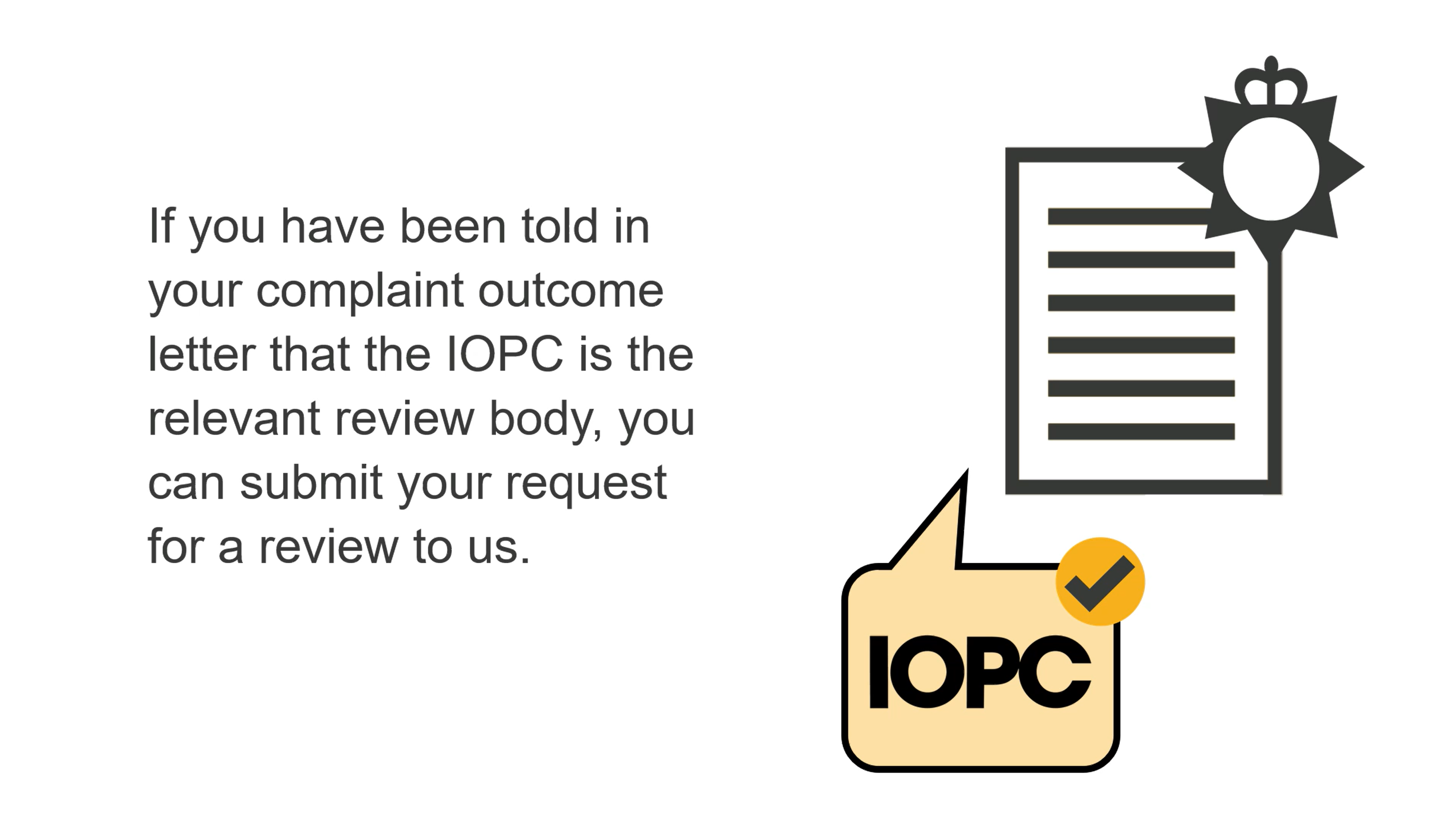Reviews and appeals

If your complaint was made on or after 1 February 2020, you have a right of review.
You can apply for a review if you are unhappy with the way your complaint was handled, or with the final outcome. It is important that you send your review to the correct organisation – sometimes, this is referred to as the relevant review body.
Your outcome letter from the police service or other organisation who dealt with your original complaint should clearly state who the relevant review body is - it could be the IOPC or another policing body, such as your local police and crime commissioner.
There are a number of potential outcomes from a review which are outlined below. We recommend reading our frequently asked questions before submitting a request to have your complaint reviewed. The IOPC can only consider reviews where we are the relevant review body.
What are the possible outcomes from an IOPC review?
We may:

| make a recommendation that the police offer an apology, or another remedy to resolve the complaint |

| direct a police force to re-investigate your original complaint |

| identify learning to help improve policing |

| agree that the complaint was handled reasonably and proportionately, resulting in no further action |
We are not able to:

| direct an organisation to provide compensation |

| open a criminal investigation or change the outcome of previous criminal proceedings, such as a caution |

| re-investigate your original complaint as part of the review process |

| comment on matters or new evidence which did not form part of the original complaint |
In exceptional circumstances we may:

| recommend disciplinary proceedings |

| independently re-investigate your complaint if our review finds that this is required |

| arrange for a referral to be made to the Crown Prosecution Service |
Requesting a review of your complaint

Frequently asked questions
Applications for reviews must be made within 28 calendar days, starting the day after the date on the outcome letter received from the organisation you made your original complaint to.
Please note, any reviews submitted to us outside of the 28 calendar days will not be considered unless exceptional circumstances apply. If you request a review out of time you will be given the opportunity to submit evidence to support your reasons.
If the IOPC is the relevant review body for your complaint, from the date we receive your application for a review, it may take up to 5 months for us to allocate your review. This is due to an exceptionally high volume of work received in the last two years which has caused a backlog of reviews awaiting allocation.
Once your request for a review has been received you will receive an email to advise you when you can expect to receive an update on your case.
We are working hard to reduce the backlog and improve our timeliness. We apologise for the length of time you may have to wait for your review to be allocated. We will regularly update this page with the current allocation times.
The organisation you complained to should have sent you a letter that tells you whether you have a right of review. If you have this right, the letter will also tell you which organisation will handle your review.
It is important that you send your review to the correct organisation – sometimes, this is referred to as the relevant review body. Your outcome letter from the police service or other organisation who dealt with your original complaint should clearly state who the relevant review body is.
The IOPC can only consider reviews where we are the relevant review body. If you are unsure who the relevant review body is, please contact the person who provided the decision in respect of your complaint.
If the IOPC is the relevant review body for your complaint, please complete our reviews form. You can also submit a review in writing, using our printable form.
Yes. You can submit more information to us if you wish up until the point that your review is allocated to a casework manager. However we encourage you to submit any information in support of your review within seven days of submission, including your outcome letter from the organisation who dealt with your complaint, to ensure any information you provide can be considered before a decision on your review is made.
Please note, we can only consider information and evidence relating to the specific complaint which has been dealt with and which your review relates to. Any information that does not relate to the original complaint will not be considered.
We are committed to ensuring that the services we offer are inclusive and accessible.
We will take reasonable steps to ensure all service users, including people with protected characteristics are able to use our services. This includes making reasonable adjustments where appropriate. A reasonable adjustment involves making a change to the way we usually do things to ensure our service is accessible to all.
If you need support to help you submit a review or require reasonable adjustments, please contact our Customer Contact Centre on 0300 020 0096. Our customer contact advisors will be able to signpost you to organisations, or advocacy services who may be able to assist you.
You may find this guide to our reasonable adjustment policy helpful.
When we receive your review form, we will check whether we are the right organisation to handle your review. If not, we will forward your review to the relevant review body and inform you that we have done so.
The relevant review body will send you a letter to acknowledge receipt of your review. They will tell you how long it’s likely to take to consider your review. The relevant review body will notify the organisation you complained about that you’ve applied for a review. They will also notify the person complained about and any other interested persons.
The relevant review body will ask the organisation that you complained about to provide it with any information they have about your complaint and how they dealt with it.
When all of the information has been supplied, the relevant review body will assess your review and make its decision. You will be told about this decision in writing. You will also receive a clear explanation about how this decision has been reached.
Appeals
If your complaint was made before 1 February 2020, you can still have your complaint reviewed. This is know as an appeal because the complaint was made before new laws came into effect. This is does not effect your rights.
There are six different types of appeal:
- You can appeal against the police force or other organisation’s investigation into your complaint.
- You can appeal if a complaint was not recorded.
- You can appeal against a decision to disapply.
- You can appeal against the outcome of the local resolution.
- You can appeal against the outcome of a complaint after the decision to disapply.
- You can appeal against the decision to discontinue an investigation.
Appeal against an investigation into a complaint made to the police or other organisation
You may be able to appeal if your complaint was dealt with through a local or supervised investigation.
You can appeal if:
- You did not receive enough information to enable you to understand why the police or other organisation came to their decision.
- You disagree with the findings of an investigation into your complaint. You might feel that the right witnesses were not interviewed, or that your complaint was misunderstood, or that the organisation you complained to did not make the right decision based on all the evidence.
- You disagree with the action the police plans to take after investigating your complaint.
- You do not think the police made the right decision about whether an officer you complained about has a case to answer for misconduct, gross misconduct, or whether their performance was unsatisfactory.
- You disagree with the decision not to refer the officer’s conduct to the CPS for a decision about whether to bring criminal charges.
You cannot appeal if your complaint relates to a direction and control issue (this does not apply if your complaint is about a contractor).
Appeal against non-recording of your complaint
You can appeal if:
- The police or local policing body did not to record your complaint. Policing bodies include Police and Crime Commissioners, the Common Council for the City of London, or the Mayor's Office for Policing and Crime. There are some occasions when they do not need to record a complaint, but you should be told why. You can find a list of circumstances where complaints do not need to be recorded in our statutory guidance.
- You complained to a force other than the one involved in your complaint. The force that received your complaint did not pass it on to the relevant force.
- The police force or local policing body fails to decide about whether to record your complaint and you do not hear from them within 15 working days.
You cannot appeal if your complaint:
- Was about a direction and control matter and the local policing body took the decision not to record it. However, you can appeal if the decision not to record was taken by the police force.
- Was not recorded because it had been withdrawn.
- Was not recorded because it has been, or is being, dealt with through disciplinary or criminal proceedings.
Appeal against a decision to disapply
You may be able to appeal if the complaints process was stopped before an investigation into your complaint began. This situation happens when the police force involved makes a ‘decision to disapply’.
You can appeal if you think the police should not have decided to disapply.
You cannot appeal if your complaint is about a direction and control issue (this does not apply if your complaint is about a contractor), or if the IOPC gave the police force permission to disapply.
Appeal against the outcome of the local resolution
You may be able to appeal if your complaint was dealt with using the local resolution process.
When the police wrote to you about the outcome of your complaint, they also told you who to appeal to. In many cases, this will be the chief officer of the police force. In other cases, it will be the IOPC.
You can appeal if:
- You think that the outcome of the local resolution of your complaint was not a proper one. This means that, for example, you believe the outcome was not appropriate to the complaint, or the outcome did not reflect the evidence available.
You cannot appeal if your complaint relates to a direction and control issue (this does not apply if your complaint is about a contractor).
Appeal against the outcome of a complaint after the decision to disapply
You may be able to appeal if the process of looking into your complaint stopped before it was investigated. When a force makes a decision to stop dealing with a complaint before investigating it, this is called a ‘decision to disapply’.
You can appeal if:
- You are not happy with the action that was taken after the decision to disapply.
- You are unhappy that no action was taken after the decision to disapply.
- You do not agree with the outcome of your complaint after the decision to disapply.
- You do not think that the outcome of your complaint after the decision to disapply was sufficient. This means, for example, that you believe the outcome was not sufficient for the nature of the complaint, or the outcome did not reflect the evidence available.
You cannot appeal if your complaint relates to a direction and control issue (this does not apply if your complaint is about a contractor).
Appeal against the decision to discontinue an investigation
You may be able to appeal if a police force decides to end the investigation it is carrying out into your complaint.
You can appeal this decision if you do not think the police should have discontinued the investigation.
Please note, you cannot appeal when the complaint relates to a direction and control issue (this does not apply if your complaint is about a contractor), or if the IOPC gave the police force permission to disapply.
When the IOPC or the police force receives your application for an appeal, it will check whether it is the right organisation to handle your application. If not, it will forward your appeal to the relevant appeal body and inform you that it has done so.
The relevant appeal body will send you a letter to acknowledge your appeal. They will tell you how long it is likely to take to consider your appeal.
The relevant appeal body will notify the organisation you complained about that you’ve applied for an appeal. They will also notify the person complained about and any other interested persons.
The relevant appeal body will ask the organisation that you complained about to provide it with any information they have about your complaint, and how they dealt with it.
When all of the information has been supplied, the relevant body will assess your appeal and make its decision. You will be told about this decision in writing. You will also receive a clear explanation about how this decision has been reached.
For more information about appeals, read our frequently asked question guides below:
What is casework?



